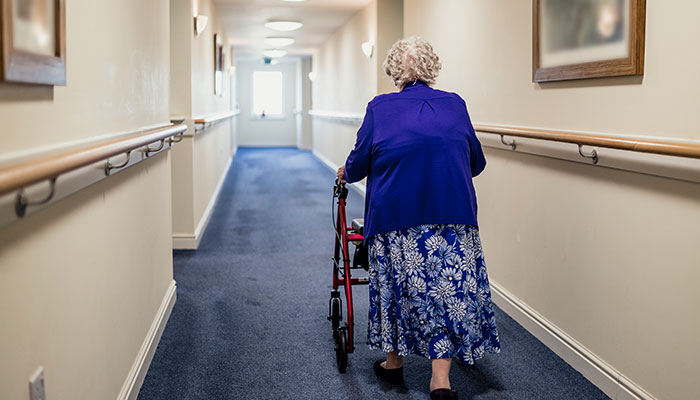Medication that can improve cognition and quality of life for people with dementia is being used at far lower rates in Australian residential aged care compared to other countries, Macquarie University research has revealed.

Less than 10 per cent of residents with dementia were taking anti-dementia medications in Australian aged care facilities, the study found, compared to about 40 per cent of people with dementia in the United States, the UK and Denmark.
The finding is described as startling given the corresponding overuse of far riskier antipsychotic drugs. Antipsychotic use to sedate people with dementia has been widely criticised, including at the Aged Care Royal Commission.
During hearings last month (May) in Sydney, the commission heard that only about 10 per cent of antipsychotic use was clearly justified.
Dr Kim Lind, lead author of the study and Research Fellow at Macquarie’s Australian Institute for Health Innovation, said in addition to slowing cognitive decline, anti-dementia medications may help reduce the behavioural and psychological symptoms of dementia for which antipsychotics, which can cause stroke, are being overused.
People should be given the opportunity to trial the medication and see if they have improvements
Unlike the anti-dementia medications, antipsychotics were originally developed for conditions like schizophrenia, and antipsychotics do not help with cognition.
“I don’t think we quite have the data to say that higher use of anti-dementia meds will reduce antipsychotic use – it has the potential to but there are a lot of other things that need to happen to reduce antipsychotic use,” Lind says.
Strict criteria may make drugs too hard to get
The AIHI study analysed the electronic data of 5354 people living with dementia in 68 residential care facilities in NSW and the ACT.
It found use of anti-dementia medication fell two percentage points from 2014 to 2017 and varied by factors that were not clinically relevant such as country of birth, marital status and where people lived.
People in outer regional areas, or who did not have a spouse, were less likely to be on the medication and those who were on it were much more likely to have started anti-dementia medications before entering residential aged care.

Treatment trial: Dr Lind believes patients should be given the opportunity to try the medication and see if their symptoms improve.
Lind says the study suggests factors for underuse also involve Pharmaceutical Benefits Scheme (PBS) policy; people not getting their medications carefully monitored and updated when in aged care; and trouble accessing specialist care to get a diagnosis.
Patients need a diagnosis of dementia confirmed by a specialist before the PBS will subsidise the medication and strict criteria mean the patient needs to show meaningful improvement after six months for the subsidy to continue.
“The PBS should look at the guidelines – they did revise and relax the guideline in 2014, but, just having to get the specialist involved seems to be a barrier and it’s certainly more of a barrier for certain demographics and likely more of a barrier for people in residential aged care,” Lind says.
An opportunity, if nothing else
There are two classes of anti-dementia medication: cholinesterase inhibitors [CEI] are prescribed for people with mild to moderate dementia, and memantine to those with moderate to severe dementia.
Most of the residents in the study who used an anti-dementia medication were using CEIs, presenting a challenge to arguments that medications were not being widely prescribed because residents’ dementia was too severe for them to benefit.
“There is scepticism about the effectiveness of these medications, which I found interesting because it’s been shown that with antipsychotics, providers tend to think they are more effective than they are, but with anti-dementia medications we have the opposite problem, where providers see them as less effective than they are,” Lind says.
“Anti-dementia medications are not going to work for everyone, and some people will have side effects.
“But they are the only pharmacological tools that you have for a really horrible disease and people should be Australian aged care facilities to trial the medication and see if they have improvements. The data suggest that people must not be getting the opportunity.
“I want to see everyone who could potentially benefit be given the option of trying these medications, and I want people with dementia to be receiving evidence-based high-quality care.”
Dr Kim Lind is a Research Fellow at the Australian Institute of Health Innovation at Macquarie University.



